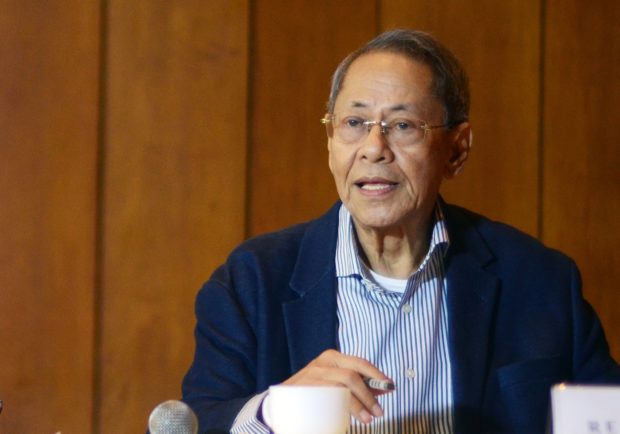Angara, former Senate President; 83
Edgardo J. Angara, a former Senate President and the country’s special envoy to the European Union (EU), died on Sunday morning at 83, ending a long career as an educator, lawyer, farmer, diplomat and patron of the arts.
Angara succumbed to a massive cardiac arrest in his Tagaytay City home, according to friends and family.
“[I am] sad to say my father, former Sen. Edgardo Javier Angara, passed on from this life this morning at the age of 83, from an apparent heart attack,” his son, Sen. Sonny Angara, said in a brief statement on Sunday.
Angara was taken to Tagaytay Medical Center and later flown by helicopter to St. Luke’s Medical Center-Global City, but he could not be revived, according to former Antique Gov. Salvacion Zaldivar-Perez, who worked with Angara in the Senate.
Bridge to EU
Article continues after this advertisementBefore his death, Angara served as the bridge between the European Union and the Duterte administration, working to defuse tensions sparked by criticisms of European politicians of the government’s brutal drug campaign and the President’s caustic remarks against the bloc.
Article continues after this advertisementIn one of his last public appearances at the National Defense College of the Philippines, Angara said President Rodrigo Duterte had offered him the ambassadorship to the United Kingdom, but he declined as he did not want to be an obstacle to the careers of younger diplomats.
The President then asked him to be the permanent ambassador to the United States, he said.
“I respectfully declined it. The job is very prestigious … but since I staffed the Commission on Appointments, there’s always a [sentiment] that the overstaying diplomat is blocking the rise of the young diplomat, and I remember that very distinctly. That’s why I declined,” Angara said.
He earned his bachelor of laws degree from the University of the Philippines (UP). He obtained his master of laws as a Dewitt Fellow, from the University of Michigan.
Con-con delegate, Accra
Angara started his political career when he was elected in Quezon province as one of the youngest delegates to the 1971 Constitutional Convention (Con-con).
A year later, he founded with a group of law classmates what would become one of the country’s top law firms, the Accra Law Offices.
In 1975, Angara became president of the Philippine Bar Association and in 1979 president of the Integrated Bar of the Philippines.
In 1980, he was chosen as founding president of the Association of Southeast Asian Nations (Asean) Law Association.
UP president
From 1981 to 1987, Angara served as president of UP.
He sought to strengthen UP’s general education program, installed a seven-year honors medical curriculum, energized the arts and basic science, and built a multicampus university organization.
“He is best remembered for defending the state university’s tradition of dissent and obtaining fiscal autonomy. His efforts contributed to upholding its reputation for academic excellence as the country’s premiere educational center,” his son said.
Angara rallied alumni in the country and abroad in a massive fundraising drive both for UP’s diamond jubilee in 1983 and centenary in 2008, when he chaired the UP Centennial Commission.
Substantial funds raised went into faculty development, scholarships, student assistance program, and massive infrastructure development.
The UP Board of Regents established in his honor the UP President Edgardo J. Angara Fellowship, the largest single grant available to UP professors.
Senate President
In 1993, he was elected Senate President.
Among the measures he pushed were the Free High School Act, Commission on Higher Education, Technical Education and Skills Development Authority, National Health Insurance Act, Senior Citizens Act, Agriculture and Fisheries Modernization Act, Renewable Energy Act and the Procurement Reform Act.
Angara authored and sponsored the laws creating the National Museum, the National Commission on Culture and the Arts, and the Natatanging Manlilikha Award, which bestows honor on the Filipino folk and traditional artists.
He also authored the National Book Publishing Industry Development Act and the National Cultural Heritage Law.
He served as chair of the Philippine National Bank from 1998 to 1999.
Angara was secretary of agriculture from 1999 to 2001, and briefly served as then President Joseph Estrada’s executive secretary before the latter was deposed in a peaceful uprising.
He also moved to rekindle the Philippines’ historic ties with Spain and Mexico. He institutionalized the Philippine-Spanish Friendship Day Act and the Dia del Galeon.
Former President Gloria Macapagal-Arroyo described Angara as a “true leader who instituted reforms for the betterment of the country.”
Expressing sympathies and condolences in a Sunday statement, Arroyo, now a Pampanga representative, said: “He was a friend who I feel fortunate to have had the opportunity to work with.”
“May his courage and leadership continue to inspire others. He will be missed but his valuable contributions to the country will never be forgotten,” said Arroyo, a former senator. —With reports from Vince F. Nonato and Inquirer Research
